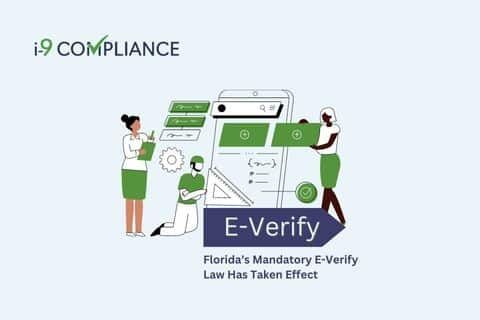Florida’s Mandatory E-Verify Law Has Taken Effect

July 17, 2023
With the arrival of July 1 came Florida’s new E-Verify requirements. According to the regulations, certain private employers in Florida must use the E-Verify system to verify the authorization to work for all new hires. This new law provides enforcement mechanisms, including stiff penalties for employers that do not comply.
The Basics of the Law
As of July 1, 2023, Florida’s new immigration law, Senate Bill 1718 (SB 1718), has taken effect. This law amends Florida Statute 448.095, requiring private employers of 25 or more to enroll in the E-Verify program. Employers cannot hire individuals lacking authorization to work in the United States. However, employers benefit from a rebuttable presumption when using E-Verify. This presumption assumes they complied with the employment eligibility verification requirements (Form I-9).
How Does E-Verify Work?
The E-Verify system is a web-based program run by the federal government. Employers can use it to verify the information they input into each worker’s Form I-9. It does this by comparing the information against databases maintained by the Department of Homeland Security and Social Security Administration. However, employers must understand that E-Verify acts as a supplement to Form I-9, not an alternative.
Whom Must Employers E-Verify Under SB 1718?
SB1718 defines employees as those that hold a permanent position under an employer. Notably, this excludes independent contractors and those performing “casual labor” in a household as defined under Florida Statute 443.036. As such, the work must prove “occasional, incidental, or irregular” and have a total duration of less than 200 man-hours, such as minor work performed by a handyman.
What Penalties Could Employers Face for Non-Compliance?
SB 1718 requires the Florida Department of Economic Opportunity (DEO) to enforce these requirements. The law authorizes DEO to investigate whether an employer knowingly employed workers without verifying their work authorization. In addition, it provides employers with a one-year grace period to comply before facing penalties.
The DEO may begin issuing penalties starting July 1, 2024. Such penalties include requiring employers to repay economic development incentives. Such employers will also receive one-year probation, providing the DEO quarterly reports demonstrating compliance with Form I-9 requirements. Any subsequent violations within 24 months may experience the “suspension or revocation of all licenses issued by a licensing agency subject to Chapter 120.”
The best way to ensure compliance with the Form I-9 and E-Verify requirements is to incorporate an electronic I-9 management system with E-Verify integration into the onboarding process. This system provides personnel with step-by-step guidance for uniform and accurate completion for every new hire.
Ensure compliance today by switching to an electronic I-9 management tool with I-9Compliance.